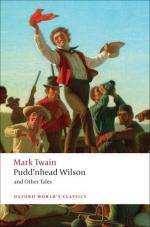When I returned to California by-and-by, I went up to Sacramento and presented a bill for general correspondence at twenty dollars a week. It was paid. Then I presented a bill for ‘special’ service on the ‘Hornet’ matter of three columns of solid nonpareil at a hundred dollars a column. The cashier didn’t faint, but he came rather near it. He sent for the proprietors, and they came and never uttered a protest. They only laughed in their jolly fashion, and said it was robbery, but no matter; it was a grand ‘scoop’ (the bill or my ‘Hornet’ report, I didn’t know which): ‘Pay it. It’s all right.’ The best men that ever owned a newspaper.
The ‘Hornet’ survivors reached the Sandwich Islands the 15th of June. They were mere skinny skeletons; their clothes hung limp about them and fitted them no better than a flag fits the flag-staff in a calm. But they were well nursed in the hospital; the people of Honolulu kept them supplied with all the dainties they could need; they gathered strength fast, and were presently nearly as good as new. Within a fortnight the most of them took ship for San Francisco; that is, if my dates have not gone astray in my memory. I went in the same ship, a sailing-vessel. Captain Mitchell of the ‘Hornet’ was along; also the only passengers the ‘Hornet’ had carried. These were two young men from Stamford, Connecticut—brothers: Samuel and Henry Ferguson. The ‘Hornet’ was a clipper of the first class and a fast sailer; the young men’s quarters were roomy and comfortable, and were well stocked with books, and also with canned meats and fruits to help out the ship-fare with; and when the ship cleared from New York harbour in the first week of January there was promise that she would make quick and pleasant work of the fourteen or fifteen thousand miles in front of her. As soon as the cold latitudes were left behind and the vessel entered summer weather, the voyage became a holiday picnic. The ship flew southward under a cloud of sail which needed no attention, no modifying or change of any kind, for days together. The young men read, strolled the ample deck, rested and drowsed in the shade of the canvas, took their meals with the captain; and when the day was done they played dummy whist with him till bed-time. After the snow and ice and tempests of the Horn, the ship bowled northward into summer weather again, and the trip was a picnic once more.
Until the early morning of the 3rd of May. Computed position of the ship 112 degrees 10 minutes longitude, latitude 2 degrees above the equator; no wind, no sea—dead calm; temperature of the atmosphere, tropical, blistering, unimaginable by one who has not been roasted in it. There was a cry of fire. An unfaithful sailor had disobeyed the rules and gone into the booby-hatch with an open light to draw some varnish from a cask. The proper result followed, and the vessel’s hours were numbered.




